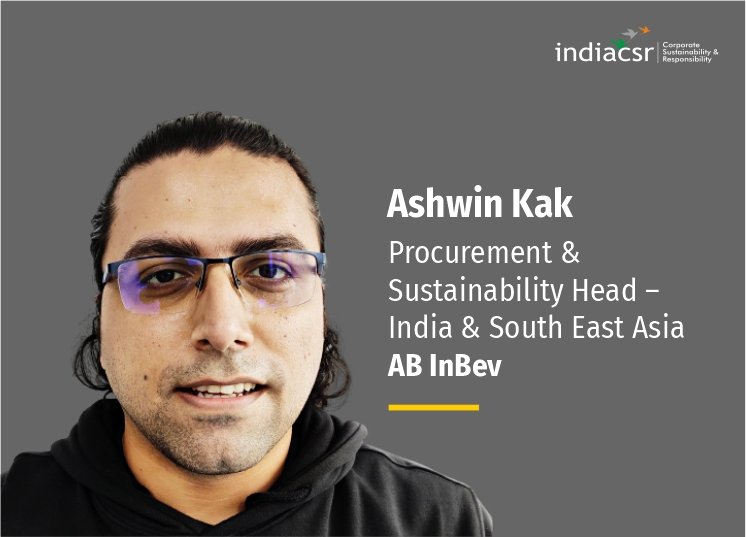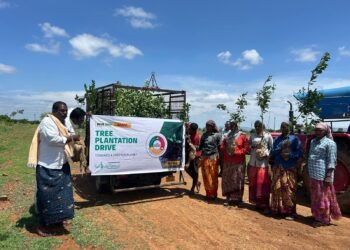AB InBev’s owned breweries have completed the transition to solar power for their operations thus allowing for sustainable brewing through the company’s association with leading renewable energy players. In line with its global commitment to secure 100% of the company’s purchased electricity from renewable sources by 2025, it has has partnered with two leading solar power companies in India to support the transition of adopting renewable electricity at its breweries. The company understands that restoring the ecosystem is the need of the hour and is constantly working towards the commitment to their 2025 Sustainability Goals through multiple initiatives across Smart Agriculture, Water Stewardship, Climate Action, and Circular Packaging.
Ashwin Kak, Procurement & Sustainability Head – India & South East Asia, AB InBev shared thoughts and views on vision, initiatives, and recent innovations.
Excerpts of an interview:
AB InBev’s most ambitious 2025 sustainability goals? Please share elaborate information
We have long been committed to creating notable impact through our crucial sustainability initiatives in India by empowering communities, building resilient supply chains, and protecting the environment. Our 2025 Global Sustainability Goals, aligned with the UN Sustainable Development Goals (SDGs), are focused on four key pillars – Smart Agriculture, Water Stewardship, Climate Action, and Circular Packaging. Through our 2025 Sustainability Goals, we connect thousands of farmers to technologies and skills, ensure water access and quality in high-stress communities, partner with our suppliers to increase recycling content, and add renewable electricity capacity to regional grids.
What are AB InBev’s plans for each of your sustainability goals? Provide recent information wherever possible along with any impact numbers.
Our purpose as a company of bringing people together for a better world has never been more relevant than today. In 2021, with intelligent partnerships, we continue creating better solutions that will benefit the communities and the environment — today and for the next 100+ years.
Smart Agriculture: Through our SmartBarley initiative, we have supported 1200 farmers by leveraging data, technology, and insights to help improve their productivity, livelihood, and efficient use of natural resources. With a focus on upskilling 100% of the farmers, AB InBev has partnered with the IIWBR to conduct training sessions & with Kisan Hub to drive farmer connectivity. The team also works on RSP initiatives in partnership with NSFI, focusing on Farmer Health & Safety and Women Empowerment. 100% of farmers are trained on health & safety, and the first women SHG was established in 2021 in Farukhnagar, Gurgaon.
Water Stewardship: AB InBev is aspiring to be at the forefront and, in this commitment, is leading several water security initiatives. We have created cumulative water recharge capacities of 1+BillionL near five high-priority breweries. This includes establishing watershed replenishment structures promoting conservation and management of water and soil for smart, sustainable agriculture. We are working closely with partners to implement innovative solutions and enable communities to increase their water resilience. The brewer spearheads water conservation within its operations by deploying effective water management programs, like adopting a rigorous water management program and state-of-the-art technologies like Zero Liquid Discharge, Wastewater recovery plants, etc. By recycling wastewater and reusing it for non-production purposes, water consumption reduced by 20-30% in the last few years.
Circular Packaging: Glass bottles today contain 35% recycled content, while cans are made up of `~76% recycled material. AB InBev focuses on four critical areas of creating a circular economy: Reuse, Reduce, Recycle, and Re-think. We continue to explore inventive new solutions in the packaging supply chain to increase recycled content, support recovery and reuse bottles while advocating for returnable solutions.
Renewable Energy: We have replaced almost 15% of power consumption with RE. Our brewery, SPR, in Mysore, has achieved ~70% RE, reducing carbon footprint by over 3.5 million kgs. PALS, Aurangabad, 2nd facility powered through solar (526 KWp), replaces almost 13% of grid electricity.
This implementation is equivalent to planting 27,000 mature trees that can absorb the CO2 quantum or drive passenger vehicles for 49 lakh km each year without any CO2 emission.
The third solar project was installed at Crown brewery, Telangana, of 998 KWP, which will replace ~18% of the grid electricity.
We have successfully eliminated CO2 emissions by 6500 MT by adopting renewable sources of electricity at these facilities. Further, to reduce carbon emissions across the value chain, we focus on optimisation and innovation. From a logistics standpoint, all LPG & diesel forklifts have been replaced with electric forklifts reducing almost 600 MT emissions annually.
Share the details of breweries with locations – Where sustainability initiatives have been taken up with partners or through collaborations. Can you share the names of any partners?
We have to date, successfully implemented various sustainability initiatives across our breweries to support communities under our larger sustainability goals. Our brewery locations include Sangareddy, Telangana, Mysore, Karnataka, Aurangabad, Maharashtra, Sonipat, Haryana, and Meerut, Uttar Pradesh.
Through our SmartBarley initiative, we have supported 1200+ farmers across Haryana & Rajasthan with a focus on upskilling farmers, along with (IIWBR). As part of our start-up and partnership outreach programs, we work with associations including Kisan Hub, NSFI, BanQu, FOSS, Zoom Agri to support farmers and their field teams.
AB InBev created cumulative water recharge capacities of more than 1 Billion Litres to date across five breweries to improve water access. AB InBev continues to work closely with ICRISAT, Jaldhaara Foundation, and LetsEndorse to implement innovative solutions. Our recent MoU with WaterAid aims to demonstrate water conservation, recharge, recycling, creating a consortium, and building a national knowledge platform.
We have also successfully reduced carbon emissions by 6500 MT by adopting renewable sources of electricity – Karnataka (SPR brewery), Maharashtra (PALS brewery) and Telangana (Crown brewery). These breweries have completed the transition to solar power for their operations, thus allowing for sustainable brewing through AB InBev’s association with CleanMax and Amp Energy India.
AB InBev is also part of RE-100, a collaborative, global initiative, and we aim to enter into similar agreements soon and demonstrate that businesses sustainability by switching to renewable electricity.
What are the Challenges faced in driving sustainability initiatives amidst the pandemic?
The year 2020 has been challenging for us all. With business-as-usual operations disrupted, continuing with our actions seemed difficult. Covid lockdown and the fear amongst the people impacted the movement of man and materials for the on-ground implementation of actions and interventions planned underwater stewardship. This was coupled with the monsoons that followed and further delaying the implementation plans. With the help of local solid partnerships and re-strategizing, the implementation plans helped complete all planned activities by the year-end.
Barley is harvested in India starting in late March. The first lockdown in India started right before crop harvest. This severely impacted our operations as we were unable to start procurement.
We leveraged digital connection with the farmers – sent weather and storage advisories via SMS to help store the barley harvest safely. Delivered gunny bags that did not have storage infrastructure on their farms.
When the lockdown eased, we immediately deployed our team to help farmers harvest. We proactively communicated with farmers and implemented a staggered procurement plan
Since the availability of labor and logistics was restricted, we assisted by sending equipment and collecting harvests from their fields. This prolonged the procurement season, but we fulfilled our commitment to the farmers.
We stood firm on our price commitment which helped drive financial security among our farmer bases.
Any community activities that were taken up by AB InBev to drive social impact, amidst the pandemic?
We extended our support to improve health infrastructure and provide essential aid across states in the country as they battle Covid-19. We equipped state governments with over 300 oxygen concentrators, 8000 essential aid kits, 5,00,000 masks, 5000 test kits in 50 villages and a Covid hospital bed set up in Bengaluru, Karnataka. We have also worked closely with local government bodies in 5 states to provide 8000 essential ration and hygiene kits across our brewery location. In 2020, we provided 15 lakh frontline workers across Delhi, Maharashtra, Uttar Pradesh, Karnataka, Telangana, and Haryana with more than 250,000 bottles of hand sanitisers, 25,000 FFP2 masks, and 3,62,100 meals to migrant workers in Bengaluru, Karnataka. We will continue to collaborate to extend our support during these unprecedented times.
How important is it for AB InBev to partner with local government bodies, public health experts, etc., to achieve the sustainability goals?
Sustainability is a critical part of our business, and as a global brewer, we are using our scale and capabilities to answer the urgent call to tackle the environmental crisis facing humanity and biodiversity. Through our ambitious 2025 Sustainability Goals, we strive to be a positive force in catalysing change. We understand that no one organisation can tackle these challenges alone, and hence, as a company, we have always believed in collaborating with governments, NGO partners, and innovators to advance the SDGs. We rely on a healthy environment and are deeply connected to the communities where we live and work, and through these efforts, we aim to build a better, brighter, and greener future.
Global practices are followed here in India to drive the sustainability 2025 agenda.
Globally, AB InBev believes in one singular ethos when it comes to sustainability – working with like-minded partners to push forth not just ours but the UN Sustainable Development Goals. We believe that no one company or individual alone can push the needle to become more sustainable. We have a strong history of partnering with organisations, NGOs, innovators, etc., to tackle some of the world’s biggest challenges. World over, we are contributing to the UN Sustainable Development Goals and broader global sustainable development agenda while building resilient supply chains, productive communities, and a healthier environment. We have deliberately focused on contributing progress toward the goals where we can use our scale and partnerships to drive meaningful positive change. Sustainability is not just a part of our business; it is our business. All interventions, solutions, and innovations offered and planed are keeping the larger community at the forefront.
***






















